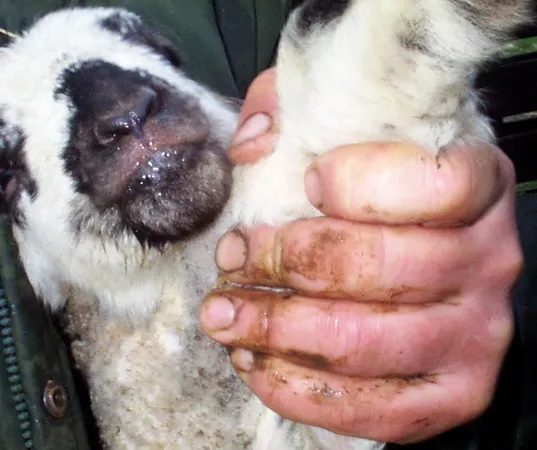Watery Mouth
Watery mouth, also known as "slavers" or "rattle belly," is a rapidly fatal disease that affects newborn lambs, typically within the first 72 hours of life. This condition is particularly common in intensively managed flocks and is characterized by profuse salivation, gut stasis, collapse, and death. It is especially prevalent in lambs born to primiparous, thin, or otherwise compromised ewes, and is more common in twins and triplets due to their reduced chance of ingesting adequate colostrum immediately after birth.

Symptoms and diagnosis of Watery Mouth 🩺
Early signs of watery mouth disease in lambs include:
- Dullness and lethargy
- Reluctance to suck
- Profuse salivation, leading to a wet lower jaw
- Swollen, tense abdomen
- Depression and disinclination to move
- Possible respiratory distress due to abdominal distension
In severe cases, the condition can progress to coma and death within 24 hours of the onset of symptoms.
Diagnosis
Diagnosis is typically based on the clinical signs observed in the live lamb. In cases of high mortality, fresh lamb carcasses should be submitted for post-mortem examination to confirm the diagnosis. Blood samples from live lambs less than one week of age can also be tested to assess colostrum intake and identify risk factors contributing to an outbreak.
How to treat Watery Mouth in sheep 💊
Early detection and prompt treatment are crucial for any chance of success. Treatment options include:
- Oral electrolyte therapy at a rate of 50 ml per kg four times daily to prevent dehydration
- Soapy water enemas or other laxatives to promote gut activity and expulsion of meconium
- Oral antibiotics during the early phase of the disease, under veterinary guidance
- Parenteral antibiotics and non-steroidal anti-inflammatory drugs (NSAIDs) to reduce the risk of endotoxic shock and make the lamb more comfortable
How to prevent Watery Mouth in sheep 🛡️
Preventive measures are the most effective way to tackle watery mouth disease. Key strategies include:
- Ensuring all lambs receive adequate amounts of good quality colostrum within the first 2 hours of birth
- Maintaining high hygiene standards in the lambing shed and pens
- Cleaning and disinfecting equipment regularly
- Moving remaining pregnant ewes to another building or turning them out to pasture, weather permitting
- Avoiding routine antibiotic administration to prevent antibiotic resistance
In case of an outbreak, seek veterinary advice to implement appropriate measures.
Conclusion
Watery mouth is a serious condition that requires prompt attention and preventive measures to protect the health and well-being of newborn lambs. By ensuring good hygiene and adequate colostrum intake, farmers can significantly reduce the risk of this disease in their flocks.

